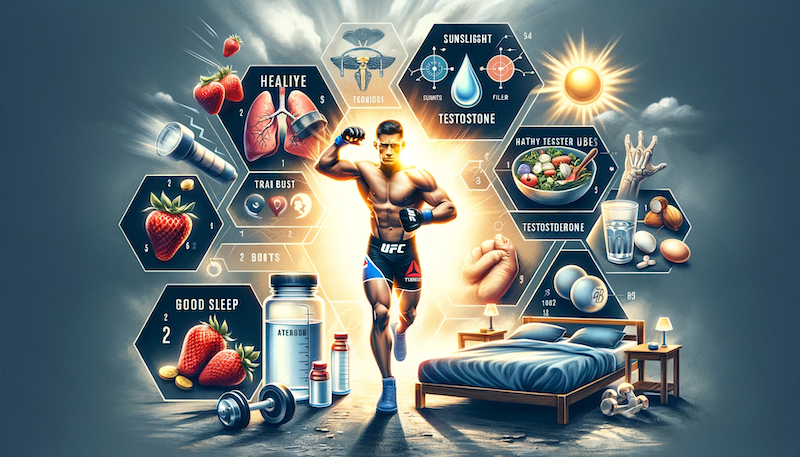
Testosterone plays a crucial role in an athlete’s performance in the high-stakes world of UFC and MMA. Testosterone increases strength, endurance, speed, aggression, and mental acuity.
Understanding how fighters optimize their testosterone levels is key to comprehending the full picture of their training and preparation.
In this article, we dive into the 11 methods used by UFC/MMA fighters to boost their testosterone levels.
Contents
- How UFC (MMA) Fighters Increase Testosterone
- 1. Anabolic Steroids
- 2. Consistent Quality Sleep (8 Hours Per Night)
- 3. Diet
- 4. Intense Strength Training and High-Intensity Interval Training (HIIT)
- 5. Rest and Recovery
- 6. Stress Management
- 7. Legal Testosterone-Boosting Supplements
- 8. Reducing Body Fat (Specifically for Heavyweight Fighters)
- 9. Water Quality (Drink Filtered Water)
- 10. Sunlight Exposure for Testosterone Enhancement
- 11. Semen Retention
- Common Misconceptions and Unproven Methods
- The Bottom Line
How UFC (MMA) Fighters Increase Testosterone
UFC (MMA) fighters increase testosterone with steroids, testosterone-boosting supplements, diet, reducing body fat, intense strength training and HIIT, consistent quality sleep, rest and recovery, stress management, sunlight exposure, drinking filtered water, and semen retention.
Let’s take a closer look at each of the 11 ways that UFC fighters increase testosterone.
1. Anabolic Steroids
Anabolic steroids are the primary substances used to directly increase testosterone levels in athletes, including UFC and MMA fighters.
These synthetic derivatives of testosterone are designed to enhance muscle mass, strength, and reduce recovery times by significantly elevating the body’s testosterone levels.
Common examples of anabolic steroids taken by UFC (MMA) fighters include Testosterone Enanthate, Nandrolone, Stanozolol, and dehydrochloromethyltestosterone (DHCMT).
These substances work by mimicking the effects of natural testosterone, leading to increased protein synthesis and muscle growth.
Due to these significant health risks and the unfair advantage they provide in sports performance, anabolic steroids are banned in professional sports.
Athletes caught using these substances face strict penalties, including fines, suspensions, and potential bans from competition.
Anabolic steroids remain the most important and effective way for UFC and MMA fighters to increase their testosterone for optimal performance.
2. Consistent Quality Sleep (8 Hours Per Night)
The profound impact of sleep on testosterone levels in athletes, particularly in UFC and MMA fighters, is underscored by a 2011 study conducted by Rachel Leproult, PhD, and Eve Van Cauter, PhD.
Their research revealed that just one week of sleep restriction to 5 hours per night led to a 10-15% decrease in daytime testosterone levels in young, healthy men.
This significant decrease is particularly noteworthy as it contrasts with the normal aging process, which is associated with only a 1-2% annual decrease in testosterone levels.
Why Sleep is Crucial for Increasing Testosterone
Testosterone and Sleep Cycles: The body’s testosterone production peaks during sleep, especially during the REM phase.
Disruptions in sleep patterns or insufficient sleep can lead to lower testosterone levels, which in turn affect muscle growth, recovery, and overall athletic performance.
Recovery and Muscle Growth: Adequate sleep is essential for muscle repair and growth, processes heavily influenced by testosterone.
The regenerative processes that occur during sleep are crucial for athletes who undergo intense physical training.
Impact of Sleep Deprivation: The study’s findings demonstrate that even short-term sleep deprivation can significantly impact testosterone levels.
For athletes, this can translate into decreased performance, slower recovery, and reduced muscle growth.
Strategies for Achieving Consistent Quality Sleep
For UFC and MMA fighters, implementing strategies to enhance sleep quality is vital. Here are some effective methods:
Sleep Hygiene
- Regular Sleep Schedule: Consistency in sleep timing helps regulate the body’s internal clock and improves sleep quality.
- Sleep-Inducing Environment: A dark, quiet, and cool environment is conducive to better sleep.
Reducing Screen Time
- Limiting Blue Light Exposure: Avoiding screens at least 2 hours before bedtime can prevent disruption in melatonin production.
Light Management
- Dimming Lights in the Evening: This helps signal the body that it’s time to wind down, aiding melatonin production.
Caffeine Management
- Avoiding Caffeine Before Bedtime: Caffeine should be avoided 8 to 10 hours before sleep to prevent sleep disturbances.
Core Body Temperature
- Cooling Down Before Bed: Activities like taking a warm bath or shower can help lower the body’s core temperature, signaling it’s time to sleep.
Incorporating these strategies can significantly improve sleep quality, which is essential for maintaining optimal testosterone levels and overall performance.
3. Diet
Diet plays a crucial role in naturally increasing testosterone levels, making it a key focus for UFC/MMA fighters looking to enhance their performance.
The right balance of nutrients supports overall health and directly influences hormonal balance, including testosterone production.
1. Key Nutrients for Testosterone
- Zinc: This mineral is vital for testosterone production. Foods rich in zinc include oysters, red meat, poultry, beans, nuts, and whole grains.
- Vitamin D: Often obtained from sunlight, Vitamin D can also be sourced from dietary supplements and foods like fatty fish, egg yolks, and fortified products. Adequate Vitamin D levels are linked to higher testosterone levels.
- Omega-3 Fatty Acids: Found in fish like salmon and mackerel, as well as in flaxseeds and walnuts, Omega-3s can improve the body’s hormonal balance, including testosterone levels.
- Magnesium: This mineral, found in leafy greens, nuts, seeds, and whole grains, has been associated with increased testosterone levels, especially when combined with regular exercise.
2. Diet Composition
- Protein-Rich Foods: Adequate protein intake is essential for muscle growth and repair. It also plays a role in maintaining healthy testosterone levels. Sources include lean meats, fish, eggs, dairy products, and plant-based options like lentils and tofu.
- Healthy Fats: Monounsaturated fats and Omega-3 fatty acids are beneficial for testosterone production. Sources include avocados, olive oil, and fatty fish like salmon and mackerel. Low-fat diets decrease testosterone in men.
- Carbohydrates: While low-carb diets are popular, carbohydrates are important for regulating testosterone levels. Whole grains, fruits, and vegetables provide the necessary carbs and fiber.
3. Avoiding Processed Foods
- Processed and Sugary Foods: These can lead to insulin resistance and weight gain, which are linked to lower testosterone levels. Reducing intake of processed foods, sugary snacks, and beverages can help maintain optimal testosterone levels.
4. Hydration
- Adequate Water Intake: While not directly linked to testosterone production, staying well-hydrated is essential for overall health and can support the body’s hormonal functions.
4. Intense Strength Training and High-Intensity Interval Training (HIIT)
The fourth most important way for UFC/MMA fighters to increase testosterone levels is through intense strength training and High-Intensity Interval Training (HIIT).
These forms of exercise are crucial for building strength and endurance and have a direct impact on naturally boosting testosterone levels.
Intense Strength Training
Muscle Building: Engaging in heavy lifting and resistance training stimulates muscle growth, which in turn can lead to increased testosterone production.
This is supported by a study that observed significant increases in growth hormone and testosterone in response to progressive resistance training.
Compound Movements: Exercises like squats, deadlifts, bench presses, and overhead presses, which work multiple muscle groups, are particularly effective for boosting testosterone.
Training Volume and Intensity: A 2021 study published in the Journal of Strength and Conditioning Research found that resistance exercises aimed at large muscle groups, using high volume and intensity, are particularly effective in increasing testosterone levels.
This supports the notion that more demanding workouts, involving more sets, reps, and heavier weights, can significantly amplify testosterone release.
High-Intensity Interval Training (HIIT)
Short, Intense Bursts of Activity: HIIT involves short bursts of intense exercise followed by brief periods of rest or lower-intensity exercise.
This format has been shown to boost testosterone levels, as evidenced by a 2017 study that found that a six-week low-volume HIIT program increased free testosterone in male masters athletes.
Variety of Exercises: HIIT can include a range of activities like sprinting, cycling, jump rope, or bodyweight exercises, providing flexibility in training routines.
Efficiency: HIIT sessions are typically shorter than traditional workouts, making them efficient for those with tight schedules.
The positive impact on testosterone and cortisol balance, as shown in a 2021 study, indicates that HIIT is not only time-efficient but also effective in improving hormonal health and physical capacity in middle-aged men.
5. Rest and Recovery
For UFC/MMA fighters, adequate recovery and rest are crucial for maintaining and increasing testosterone levels, essential for hormonal balance and peak performance.
Importance of Recovery in Testosterone Regulation
- Hormonal Balance: Intense training can elevate stress hormones like cortisol, which may negatively impact testosterone. Proper recovery helps rebalance these hormones.
- Muscle Repair and Growth: Testosterone, vital for muscle repair and growth, is enhanced during rest periods when the body repairs muscles.
- Preventing Overtraining: Overtraining can decrease testosterone levels. Incorporating rest days and lighter training is essential to avoid this.
Strategies for Effective Recovery
- Active Recovery: Light exercises such as walking or yoga on rest days aid muscle recovery. UFC/MMA should have 1 or 2 days off per week to fully recover.
- Quality Sleep: Crucial for testosterone production, ensuring adequate sleep is a key recovery strategy.
- Nutrition and Hydration: A balanced diet and staying hydrated support muscle repair and recovery.
- Stress Management: Techniques like meditation can help maintain healthy testosterone levels.
Role of Resting Periods
Modulating Testosterone Levels: According to “Various Factors May Modulate the Effect of Exercise on Testosterone Levels in Men”, shorter rest periods in moderate-intensity exercises might effectively maintain elevated testosterone levels.
Monitoring and Adjusting Training Load
- Listening to the Body: Athletes should be attentive to signs of fatigue and adjust their training accordingly. If a fighter feels pain and is too fatigued to train optimally, they should take a rest day and prioritize sleep.
- Adjusting Training Intensity: Balancing training intensity and volume is key to optimizing testosterone levels and performance.
6. Stress Management
Stress management is the sixth crucial method for UFC/MMA fighters to naturally increase testosterone levels.
Chronic stress can lead to elevated cortisol levels, a hormone that when in excess, can negatively impact testosterone production and overall hormonal balance.
Understanding the Impact of Stress on Testosterone
- Cortisol and Testosterone: Cortisol, the body’s primary stress hormone, can inhibit testosterone production when consistently elevated. This hormonal imbalance can affect muscle growth, recovery, and overall athletic performance.
- Psychological and Physical Stress: Both mental and physical stressors can lead to increased cortisol levels. For athletes, managing stress is as important as physical training and recovery.
Techniques for Effective Stress Management
- Mindfulness and Meditation: Practices like mindfulness and meditation can significantly reduce stress levels, promoting a more balanced hormonal state.
- Adequate Sleep: Quality sleep is not only crucial for recovery but also for managing stress and maintaining hormonal balance.
- Recreational Activities: Engaging in hobbies or activities outside of training can provide mental relief and reduce stress levels.
- Professional Support: Sometimes, seeking help from sports psychologists or counselors can be beneficial in managing stress effectively.
- Pre-Competition Strategies: Implementing relaxation techniques before competitions can help reduce performance anxiety, a common stressor for athletes.
7. Legal Testosterone-Boosting Supplements
Legal testosterone-boosting supplements are another method used by UFC/MMA fighters to potentially enhance their testosterone levels.
These supplements often contain natural ingredients believed to support the body’s testosterone production.
Key Ingredients in Testosterone-Boosting Supplements
- D-Aspartic Acid: An amino acid linked to testosterone production and increased luteinizing hormone, which plays a role in testosterone synthesis.
- Fenugreek: A herb that may help increase testosterone levels by inhibiting enzymes that break down testosterone.
- Tribulus Terrestris: Often claimed to improve testosterone levels, although scientific evidence is mixed.
- Zinc and Magnesium: Essential minerals for testosterone production and overall hormonal health.
8. Reducing Body Fat (Specifically for Heavyweight Fighters)
While most UFC/MMA fighters maintain a lean physique, the issue of body fat and its impact on testosterone levels might be particularly relevant for heavyweight fighters, as they have an upper weight limit of 265 lbs.
Therefore, heavyweights might see different effects from body fat reduction compared to their lighter counterparts.
Impact of Body Fat on Testosterone In Heavyweights
- Moderate Obesity and Testosterone: The study “Lowered testosterone in male obesity: mechanisms, morbidity, and management” highlights that moderate obesity predominantly decreases total testosterone levels. This decrease is attributed to insulin resistance-associated reductions in sex hormone-binding globulin (SHBG).
- Severe Obesity: More severe obesity can additionally lead to reductions in free testosterone levels due to suppression of the hypothalamic-pituitary-testicular (HPT) axis.
- Application for Heavyweight Fighters: For heavyweight fighters, particularly those closer to the upper weight limit, managing body fat might have a more pronounced effect on testosterone levels. This could involve targeted nutritional strategies and training regimens.
Body Fat Reduction in Lower Weight Classes
- General Body Fat Reduction: For fighters in lower weight classes, if an athlete is carrying a higher percentage of body fat than optimal for their frame and fitness goals, reducing body fat could potentially improve testosterone levels.
9. Water Quality (Drink Filtered Water)
The quality of water consumed by UFC/MMA fighters can have an impact on their testosterone levels, as certain contaminants found in water are known to be endocrine disruptors.
The 2020 study “Endocrine Disruptors in Water and Their Effects on the Reproductive System” provides insights into how these contaminants can affect hormonal balance.
Impact of Water Contaminants on Testosterone
- Trihalomethanes (TTHMs): In China, exposure to TTHMs was associated with decreased sperm concentration and serum testosterone in men. This suggests that certain byproducts in water can directly impact testosterone levels.
- Perfluorooctanoic Acid (PFOA): Exposure to PFOA damaged seminiferous tubules, increased spermatogonial apoptosis, and decreased testosterone levels in the testes of mice. This indicates that fluorinated substances in water can also negatively affect testosterone.
Implications for Fighters
- Filtered Water: Considering these findings, UFC/MMA fighters might benefit from consuming filtered water to reduce exposure to these harmful contaminants. Filtered water can potentially remove or reduce the concentration of endocrine-disrupting chemicals.
- Awareness of Water Sources: Fighters should be aware of their water sources, especially in areas where water contamination is a known issue. Using water filters or consuming bottled water from reputable sources can be a precautionary measure.
Note: The study includes important findings from both human and animal research on the impact of waterborne contaminants on testosterone levels. While informative, further research is needed to fully understand the implications for specific groups like athletes.
10. Sunlight Exposure for Testosterone Enhancement
Sunlight exposure is a natural and effective way for UFC/MMA fighters to potentially increase their testosterone levels. The synthesis of Vitamin D through skin exposure to sunlight plays a significant role in this process.
The Role of Sunlight In Boosting Testosterone
Vitamin D Synthesis: Sunlight, particularly UVB radiation, is crucial for the synthesis of Vitamin D in the skin.
Vitamin D has been linked to testosterone production, with studies showing a positive correlation between Vitamin D levels and testosterone.
A study titled “Association between plasma 25-OH vitamin D and testosterone levels in men” suggests that Vitamin D might increase testosterone production.
This is supported by experimental studies and cross-sectional research showing positive associations between plasma Vitamin D and testosterone levels.
Additional Benefits: Besides its impact on testosterone, sunlight exposure can also enhance overall mood and energy levels, which are beneficial for athletes.
Regular Sunlight Exposure: UFC/MMA fighters should aim to get regular sunlight exposure for Vitamin D synthesis.
11. Semen Retention
Semen retention is a practice some UFC fighters adopt, believing it boosts testosterone levels and as a result enhances focus, aggression, and drive – key elements for competitive performance in the ring.
Concept and Perceived Benefits
- Conserving Sexual Energy: The idea behind semen retention is the conservation of sexual energy, which is then redirected towards improving mental and physical performance. This practice is thought to contribute to a heightened state of focus and aggression, essential for MMA fighting.
- Mental Toughness and Self-Control: The discipline required for semen retention may foster mental toughness and self-control, qualities that are invaluable in competitive MMA.
Scientific Perspective and Fighter Experiences
Study on Testosterone Levels: A study titled “A research on the relationship between ejaculation and serum testosterone level in men” found that testosterone levels peaked on the seventh day of abstinence, supporting the belief that semen retention can temporarily boost testosterone levels.
This means that if fighters practice semen retention 7 days before a week, their testosterone will be boosted and they can improve their chances of winning.
Avoiding Relaxation Chemicals: By abstaining from sexual activity, fighters may avoid the release of chemicals like oxytocin and prolactin, which can induce relaxation and sleepiness, thereby maintaining a state of alertness and drive.
Advocacy by Notable Fighters: Several renowned fighters, including Daniel Cormier, Israel Adesanya, Mike Tyson, Muhammed Ali, David Haye, and Floyd Mayweather Jr have adopted semen retention, citing increased aggression and drive as key benefits.
Common Misconceptions and Unproven Methods
In the quest to boost testosterone levels, athletes often explore various methods. While some practices are popularly believed to enhance testosterone, many don’t have substantial scientific evidence to support these claims.
It’s important to distinguish between what’s scientifically proven and what remains within the realm of anecdote or theory. Let’s take a look at some methods lacking scientific evidence:
- Saunas and Cold Therapy: These practices are often thought to impact hormonal levels, but scientific studies specifically linking them to increased testosterone are limited.
- Red Light Therapy: Used for various health benefits, its direct impact on testosterone levels is not conclusively proven.
- Creatine and BCAAs: While beneficial for muscle growth and recovery, their direct influence on testosterone levels isn’t established.
- Electrolytes: Essential for hydration and muscle function, especially after weight cutting, their direct impact on testosterone is minimal.
- Fish Oils and Beta-Alanine: These supplements offer various health benefits, but their role in boosting testosterone isn’t conclusively supported by scientific evidence.
The Bottom Line
In the competitive world of UFC and MMA, optimizing testosterone levels is a multifaceted approach involving various strategies.
From the use of anabolic steroids (despite their legal and health risks) to natural methods like consistent quality sleep, diet, intense training, and stress management, fighters employ a range of techniques to boost their performance.
Practices like semen retention, though scientifically debated, are also considered for their potential psychological and hormonal benefits. Additionally, factors like water quality and sunlight exposure play a role in maintaining hormonal health.
Ultimately, each method offers unique advantages and considerations, and fighters must carefully balance these to achieve peak performance while maintaining overall health and adhering to sports regulations.




